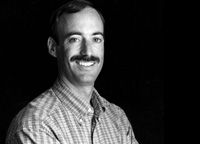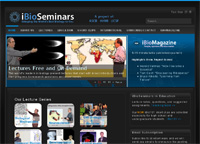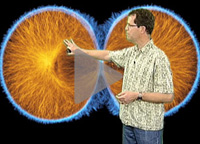« Prev Next »
 In today's podcast, Ilona interviews Ron Vale, an HHMI Investigator and Professor of the Department of Cellular and Molecular Biology at the University of California, San Francisco. In addition to being a cell biologist and an active researcher of cell motility and cytoskeleton dynamics, Ron is deeply committed to developing high-quality resources for science education. In 2007, with the support of the ASCB, HHMI and UCSF, Ron launched a project called the iBioSeminars, whose ongoing mission is to offer free online lectures that describe ongoing research in leading laboratories. These lectures can be used for teaching and learning, and they cover topics as diverse as evolution, global health, cell biology, and neuroscience. In parallel, Ron has just launched a companion of the iBioSeminars website called iBioMagazine, which features short videos of personal insight from scientists about their experiences in their research careers. All of these videos are available for free and are used by over 140 countries around the world. Listen to this podcast to learn how the rapidly growing video series can help equalize access to the discoveries of science research. [10:28]
In today's podcast, Ilona interviews Ron Vale, an HHMI Investigator and Professor of the Department of Cellular and Molecular Biology at the University of California, San Francisco. In addition to being a cell biologist and an active researcher of cell motility and cytoskeleton dynamics, Ron is deeply committed to developing high-quality resources for science education. In 2007, with the support of the ASCB, HHMI and UCSF, Ron launched a project called the iBioSeminars, whose ongoing mission is to offer free online lectures that describe ongoing research in leading laboratories. These lectures can be used for teaching and learning, and they cover topics as diverse as evolution, global health, cell biology, and neuroscience. In parallel, Ron has just launched a companion of the iBioSeminars website called iBioMagazine, which features short videos of personal insight from scientists about their experiences in their research careers. All of these videos are available for free and are used by over 140 countries around the world. Listen to this podcast to learn how the rapidly growing video series can help equalize access to the discoveries of science research. [10:28]
![]()



Full transcript
ILONA MIKO: Welcome to the latest edition of NatureEdCast, by Nature Education. I'm Ilona Miko, and today we're talking to Ron Vale, an HHMI Investigator and Professor of the Department of Cellular and Molecular Biology at the University of California, San Francisco.
In addition to being a cell biologist and an active researcher of cell motility and cytoskeleton dynamics, Ron is deeply committed to developing high-quality resources for science education. In 2007, with the support of the ASCB, HHMI, and UCSF, Ron launched a project called, the iBioSeminars, whose ongoing mission is to offer free online lectures that describe ongoing research in leading laboratories. These lectures can be used for teaching and learning, and they cover topics as diverse as evolution, global health, cell biology, and neuroscience. In parallel, Ron has just launched a companion of the iBioSeminars website, called iBioMagazine, which features five- to fifteen-minute videos of personal insight from scientists about their experiences in their research careers. All of these videos are available for free. Welcome, Ron.
RON VALE: Well, thank you. Nice to be talking to you.
MIKO: Thanks for joining us. So tell us, what is iBioSeminars?
VALE: Okay, well, iBioSeminars is a web portal, and it allows you to view and download lectures from prominent biologists for free. And right now there are about 55 of these lectures on the website, and we plan to grow them by about twenty per year. Also, I should say that there's certainly a lot of lectures on the web right now, but I think what makes iBioSeminars a little bit different is that the speakers are filmed in a studio using what's called green screen technology, and you've probably seen this on television, for example, when the weatherman or woman is pointing to something like a hurricane on the screen. So, the final video that you see shows the speaker superimposed and interacting with his or her PowerPoint slides, which makes it an engaging format. And also, the one other difference from a traditional university seminar is that there's a longer, for example, thirty- to forty-minute introduction, to the field for a non-specialist and students. And the intro and the research part of the seminar can be downloaded separately.
Also, the iBioSeminars site has a lot of resources for teachers. Some of the lectures have, for example, lecture notes and questions and assignments for students. There are also special videos on important methods used in biology, such as microscopy and mass spec, and as you mentioned, we just launched this new companion series, called iBioMagazine, and these are much shorter videos, between five and fifteen minutes, and they're intended to go behind the scenes of how science is practiced. So, for example, we have well-known scientists talking about how they make key discoveries or videos that provide advice for young scientists or discussion of different career paths. So iBioMagazine is intended to be more of a lively discussion about important issues for young scientists that are rarely discussed in textbooks or in other parts of formal education.
MIKO: Well, that sounds like a rich library of video content and different kinds. Who actually accesses iBioSeminars? What's the audience for this website?
VALE: Well, it seems to be quite broad. I would say that the intended sweet spot is advanced undergrads and grad students. But we also know that many senior high school students are viewing these lectures as well as many full professors, and even on the latter category, I personally really enjoy these seminars and I like downloading them on my iPad and then viewing them when I have a convenient moment. We also know that teachers are using this as a resource to supplement their teaching. For example, students can view an iBioSeminars and then discuss the content with their teachers and or their peers, and it's a good way for students to learn about a subject but also to go beyond that and see how a leading scientist goes about and to do their research. And also, there are a lot of self-contained video clips — like one to five minutes — that teachers can download and insert them into their own PowerPoint lectures. And lastly, I guess I could say about the audience, it's very international. iBioSeminars has been viewed in 145 countries, so it's really intended to be a worldwide scientific and educational resource.
MIKO: That's great, sounds like it's getting a lot of traction outside the US. So how did it start? Tell us a little bit about how this idea for it started? How did Ron Vale decided he had to do iBioSeminars?
VALE: It's a good question. I would say the initiating moment came after I went, in 2006, and traveled to a conference in India. And I just realized how far I traveled and how relatively few people I reached with that talk that I gave there — basically, one medium-sized auditorium at one institute. And from that experience, I just began to realize that there's a strong need to really broaden access of people around the world to science and scientists. So I'm fortunate to be at a very privileged research university, UCSF, and here we have a great seminar series. And this seminar series is indeed very important to our community because these seminars convey how scientists think about problems, which simply cannot easily be inferred just by reading papers. But you know, then I began to think, how many places in the US and outside the US do not have major seminar series? And this certainly includes small colleges, teaching colleges, community colleges. You know, but it also includes even larger institutions that are not, I would say, part of the West and East coast US lecture circuit. And you know, in addition, these days flying in speakers is an expensive proposition and many places simply can't afford to do that or don't have access to top scientists who have, you know, limited travel time. So iBioSeminars is really an attempt to equalize access to scientists and discussion of research.
MIKO: That sounds really fabulous. It sounds like it's a way for students who don't normally encounter the lecture series, maybe even undergrads don't often go to the lecture series. I know a lot of grad students go. And the teacher says as well, to have them be able to speak to people who are prominent researchers and also who discuss their discoveries face-to-face — I know there's a lot of value in that. And certainly, people tend to remember what they learn when they see a person speaking about it, rather than reading about it.
VALE: Exactly.
MIKO: So there's a lot about the media format in this that I think works really well. So what's next for iBioSeminars? What's on the docket for its growth and coming up in the next few years?
VALE: Well, I would say, you know, the biggest thing is first of all to keep doing what we're doing, which is continually add new speakers of high quality to this series. You know, so right now, for example, there are about 73 lectures on iBioSeminars and iBioMagazine. And two-thirds of them are speakers who are members of the National Academy of Science in the US, Six are Nobel Prize winners, about a third of the speakers are women. So, we want to keep going on that same track: recruit more speakers of great quality, also more diverse speakers. We want to branch out into new fields of biology, including ecology, computational biology, more lectures on evolution. So we have a lot of work to do just to keep the series going at this quality. And each lecture actually takes quite a bit of work. But we want to do more international outreach. In 2011, we're planning to add subtitled lectures in English, Spanish, and Mandarin, at least for about half the talks. I'm also quite excited that EMBO and European Molecular Biology Lab at Heidelberg have agreed to set up an iBioSeminar studio in Heidelberg, which will allow us to film more European speakers. We have an idea for exploring and perhaps piloting a live, web-based question-and-answer interaction with speakers that will allow distant viewers to ask questions directly to the speaker. And also, dissemination's really important, so we have to keep our work going to make more students and teachers aware of iBioSeminars, both in the US and internationally. And all of this is a lot of work. I just want you to keep in mind that this is really a grassroots effort that I direct, with less than a handful of part-time people. So right now, we don't have a full-time employee, but I'm hoping we're going to get a larger grant in the future and get more human resources, which will allow us to expand in the many ways that this exciting seminar series can grow.
MIKO: Can you give us a sense of how long it takes just produce one of these average iBioSeminars, just from start to finish, so we have a sense of how much goes into it?
VALE: Well, I can't give an exact time. But I can give you an idea of the process, that first we have to obviously recruit the seminar speaker. Then we work with them very closely on their content, and they send their PowerPoints in advance. We have to go through and edit them, send them back to the speaker, make suggestions. The speaker has to come to the studio and film it. There's a lot of editing work that goes on. We review the edited video for content, send it back to the speaker so that they can view it, make any suggested changes, and then we place it on the website. In addition, we often make edits of that larger lecture — we make sort video clips. For some lectures, we add the teaching tools. And we also have a new series called iBio 101, where we take segments of lectures that — maybe the whole lecture is too detailed for a high school student, but part of the content is really good for high school and maybe first-year undergrads — so we edit and process those parts as well. So I think you can gather from all of that that, you know, we put a lot of work into each and every one of these lectures.
MIKO: It's true, and it sounds like that work really pays off because it makes the material accessible to a lot of different kinds of learners, a lot of different age levels, and with this new subtitle feature that you're, they're planning on doing a lot of different types of languages. So thank you so much for joining us, Ron, and telling us about iBioSeminars. I really appreciate it.
VALE: Well, it was pleasure, and thank you for inviting me.
MIKO: Thank you for listening to this edition of NatureEdCast. You can find this podcast and others at nature.com/scitable. That’s nature.com/s-c-i-t-a-b-l-e. Please join us again next time.























